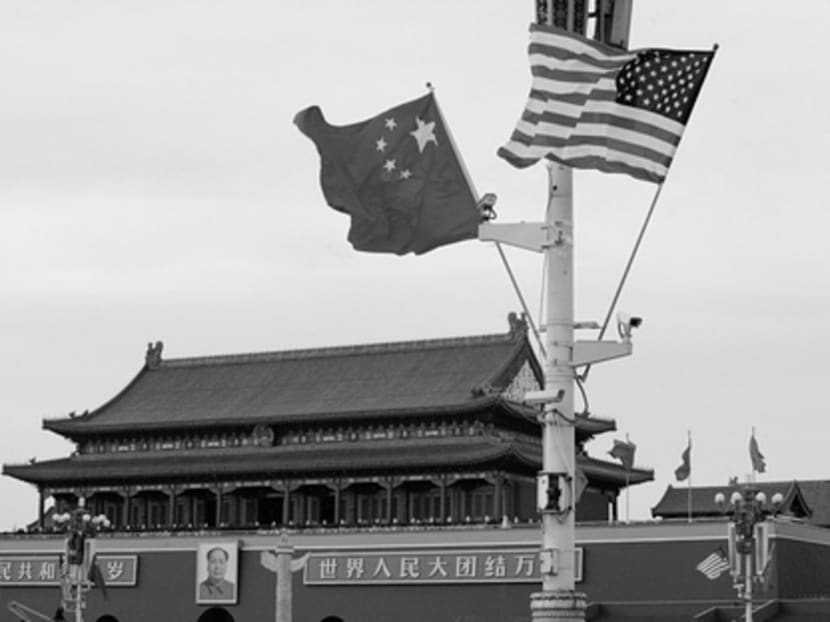The West has lost intellectual self-confidence
For the first half of my life, international politics was defined by the Cold War. The fall of the Berlin Wall ended that era and began another one: The age of globalisation. Now, 25 years later, it feels like we are once again witnessing the close of an era.

A US and a Chinese flag in front of Tiananmen Gate in Beijing. The rise of China has raised questions about how long America’s reign as the sole superpower can continue. PHOTO: REUTERS
For the first half of my life, international politics was defined by the Cold War. The fall of the Berlin Wall ended that era and began another one: The age of globalisation. Now, 25 years later, it feels like we are once again witnessing the close of an era.
The sense that things are changing is strongest in the realm of ideas. In the past few years, the West has lost confidence in the strength of the three props on which the post-Cold War world has been constructed: Markets, democracy and American power.
The success of these three ideas was, of course, connected. Once the Cold War had ended, it was natural to ask why the Western system had prevailed. The obvious conclusion was that democratic, market-based systems had simply outperformed command economies and authoritarian politics. As the popular saying went: Freedom works. The result was that the United States was not only the only superpower left standing. It also enjoyed intellectual hegemony.
After the fall of the wall, there was a new vigour behind the spread of market economics and democratic politics around the world. It was appropriate that the free-market consensus championed by the World Bank and the International Monetary Fund (IMF) came to be known as the “Washington consensus”.
The political equivalent of the Washington consensus was the belief that democracy would eventually triumph not only in eastern Europe, but all over the world.
And in the 1990s, countries as diverse as South Africa, Chile and Indonesia did indeed complete successful transitions to democracy. Underpinning these economic and political developments was the fact that the US was the unchallenged global superpower and at the centre of the military and strategic system all over the world — from Latin America to East Asia, the Middle East and Europe.
In many ways, that is the world we still live in. And yet, there are growing doubts in the West about the trinity of ideas around which the post Cold-War world has been constructed: Markets, democracy and American power. In each case, there was a signature event that served to undermine confidence.
WHAT WENT WRONG
The faith in free markets was severely shaken by the financial crisis of 2008 and the subsequent Great Recession — and has never really recovered. Although the global depression that many feared was avoided, the exuberant belief in the ability of free markets to raise living standards all over the world has not returned.
In much of the West, economic debate is instead dominated by discussion of income inequality — with Europe adding an extra layer of anxiety about the euro and high unemployment. Star emerging markets, such as Brazil and India, have lost their fizz and even China is slowing. The belief that there is a market-based formula out there that all sensible policy makers can adopt — a “Washington consensus” — has faded, to be replaced by a global lack of consensus.
Democratic evangelism, meanwhile, has been undermined by the horrors unleashed by the Arab uprisings. The wave of revolutionary change that hit the Middle East in 2011 initially looked like the Arab equivalent of the fall of the Berlin Wall.
Authoritarian systems were tumbling and new democracies seemed to be emerging. But the failure of democracy to take root in any of the countries that underwent revolutions, with the exception of Tunisia, has undermined faith in the inevitable advance of political freedom.
Just as troubling, in some ways, is an emerging loss of faith in the ability of established democracies to deliver competent government. In the US, respect for Congress is at near-record lows.
In European states such as Italy and France, the political systems seem incapable of delivering reform or growth — and voters are flirting with extremist parties.
The third prop of the age of globalisation is American power. That, too, looks less reliable than it did a decade ago. Here the central event was the Iraq war.
That conflict, unleashed by President George W Bush, initially looked like a triumphant demonstration of US might as Saddam Hussein was swept from power.
But America’s inability to stabilise Iraq or Afghanistan, despite many years of effort, has demonstrated that while the US military can destroy a hostile regime in weeks, it cannot guarantee a stable post-war settlement. More than a decade after the fall of Baghdad, America is back at war in Iraq — and the Middle East as a whole is in a state of violent anarchy.
The rise of China has also raised questions about how long America’s reign as the sole superpower can continue. In October last year, the IMF announced that — measured in terms of purchasing power — China is now the world’s largest economy.
It is still miles away from matching America’s international political reach. But America’s own ability and willingness to sustain its role as global hegemon is open to question.
That said, it is worth remembering that the fall of the Berlin Wall came at a time when many in the US were obsessed with the rise of Japan.
That should serve as a reminder of how quickly the intellectual climate can shift and fashionable preoccupations fade.
But while the start of the year has seen a revival of the US economy, the revival of the West’s intellectual self-confidence still looks a long way off. THE FINANCIAL TIMES
ABOUT THE AUTHOR:
Gideon Rachman is the chief foreign affairs commentator at the Financial Times.






